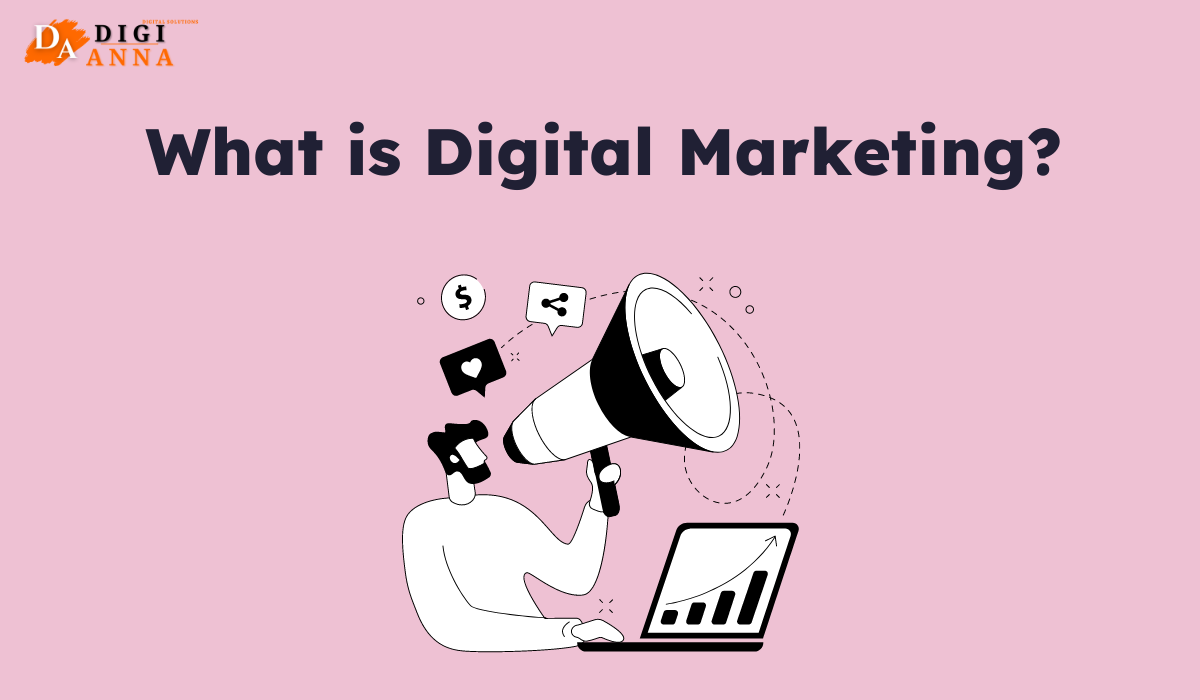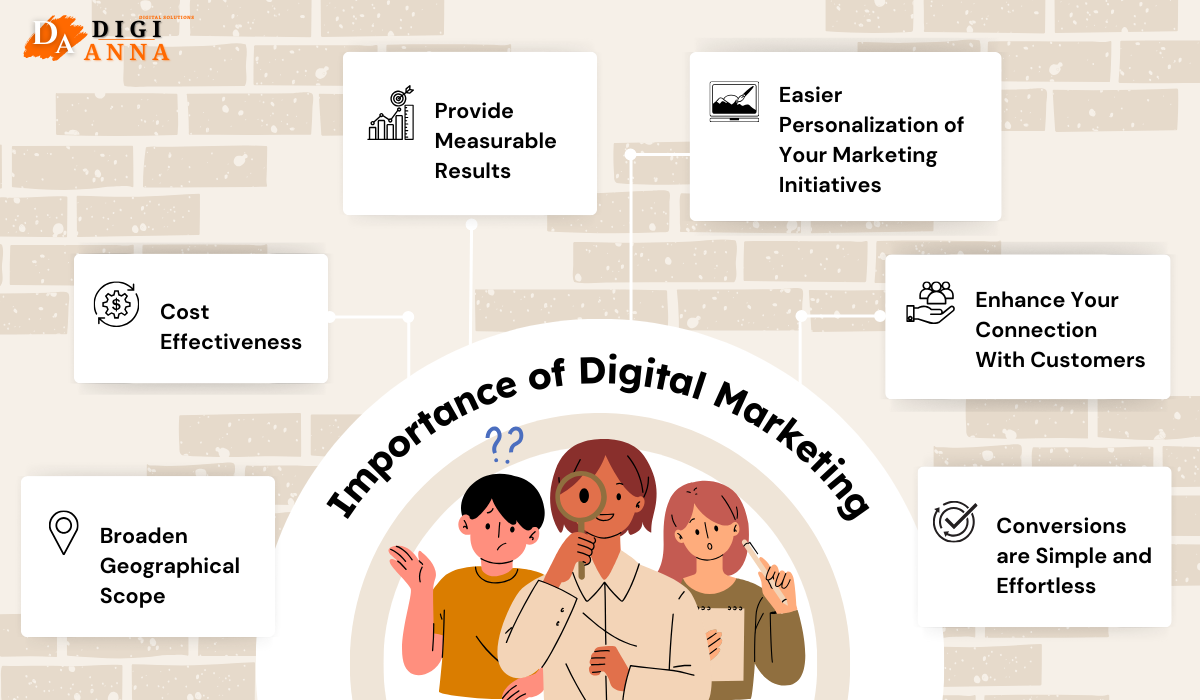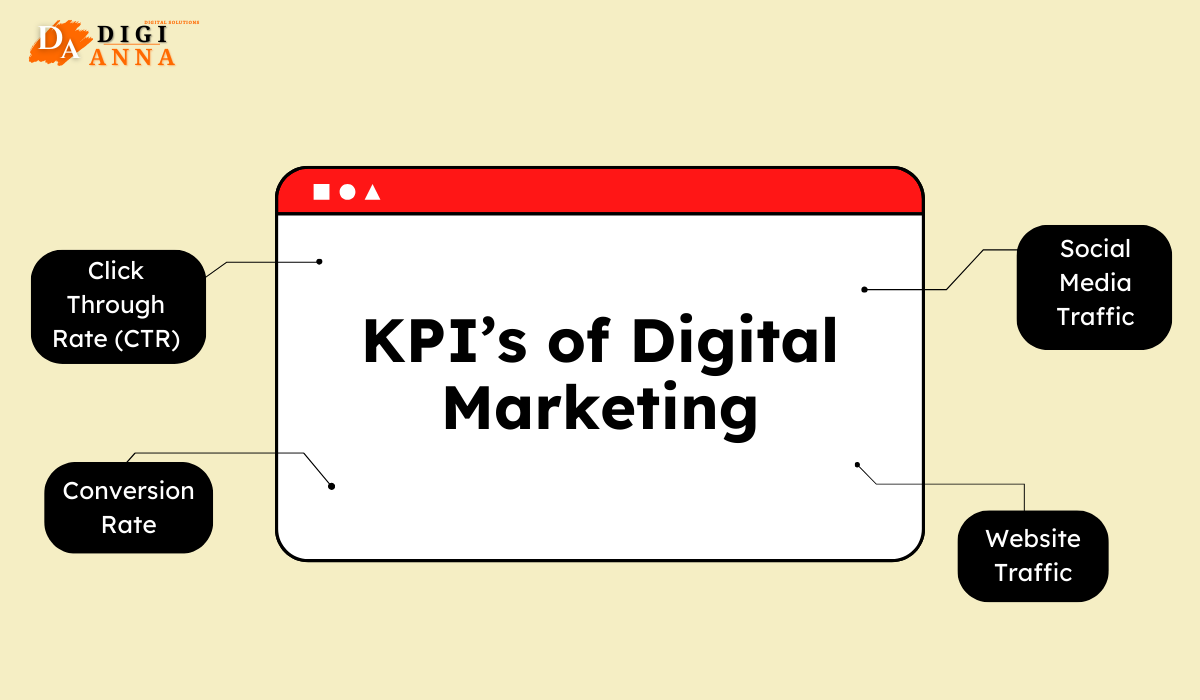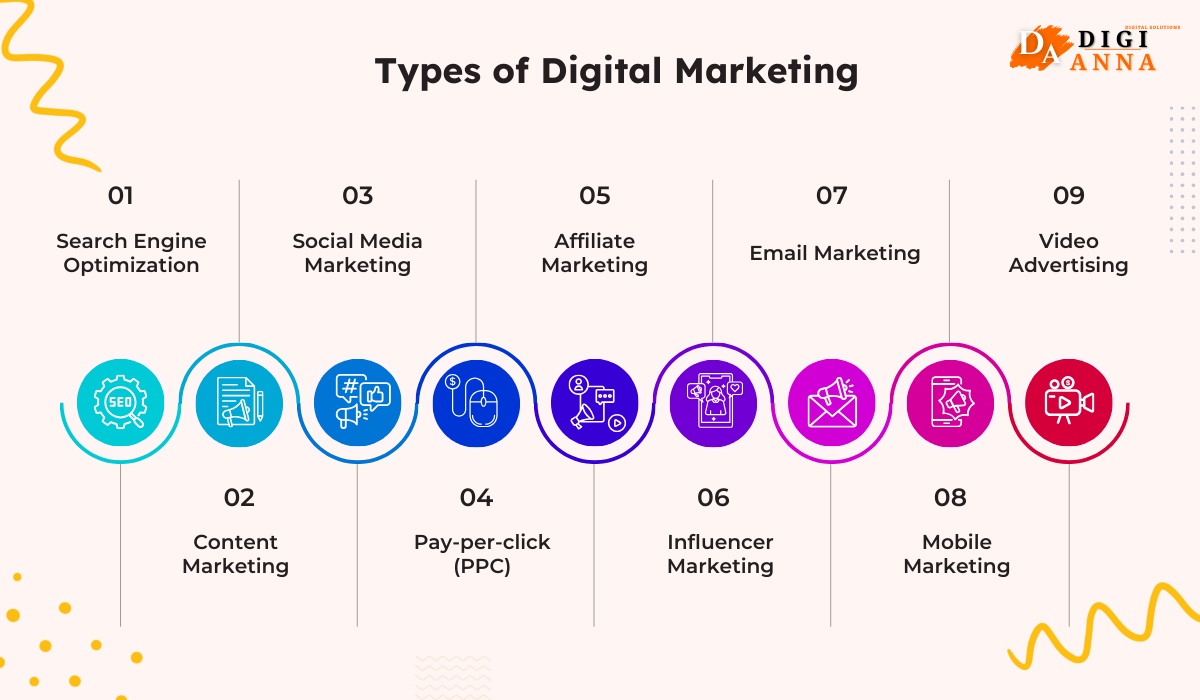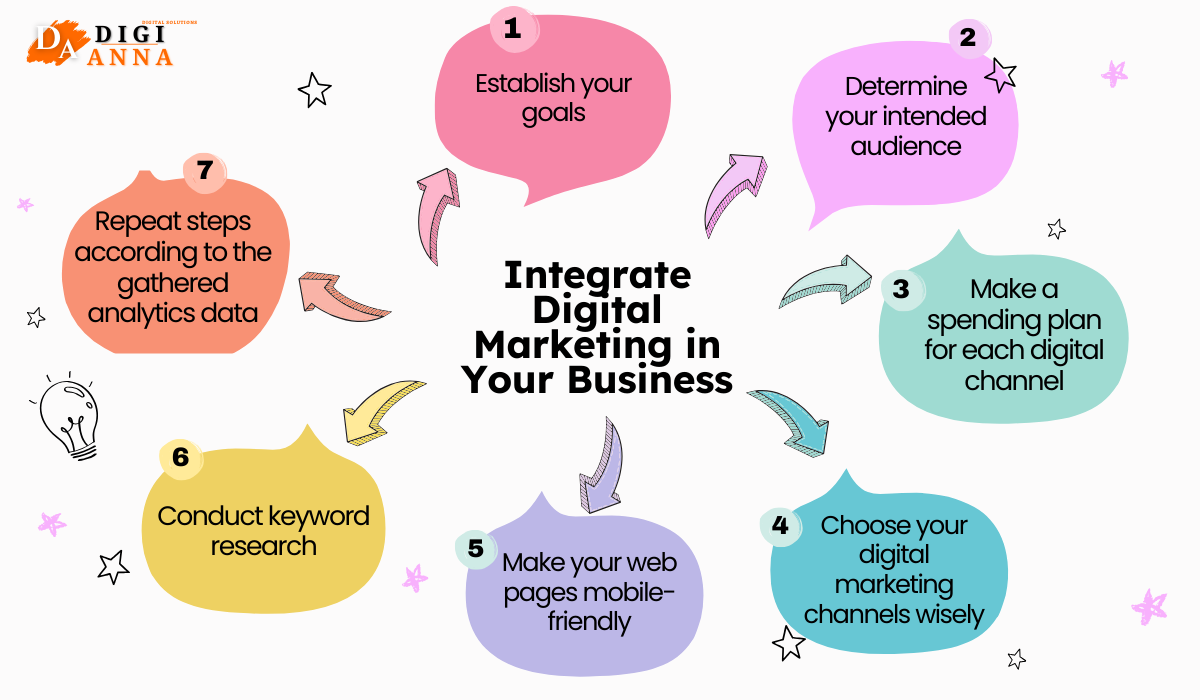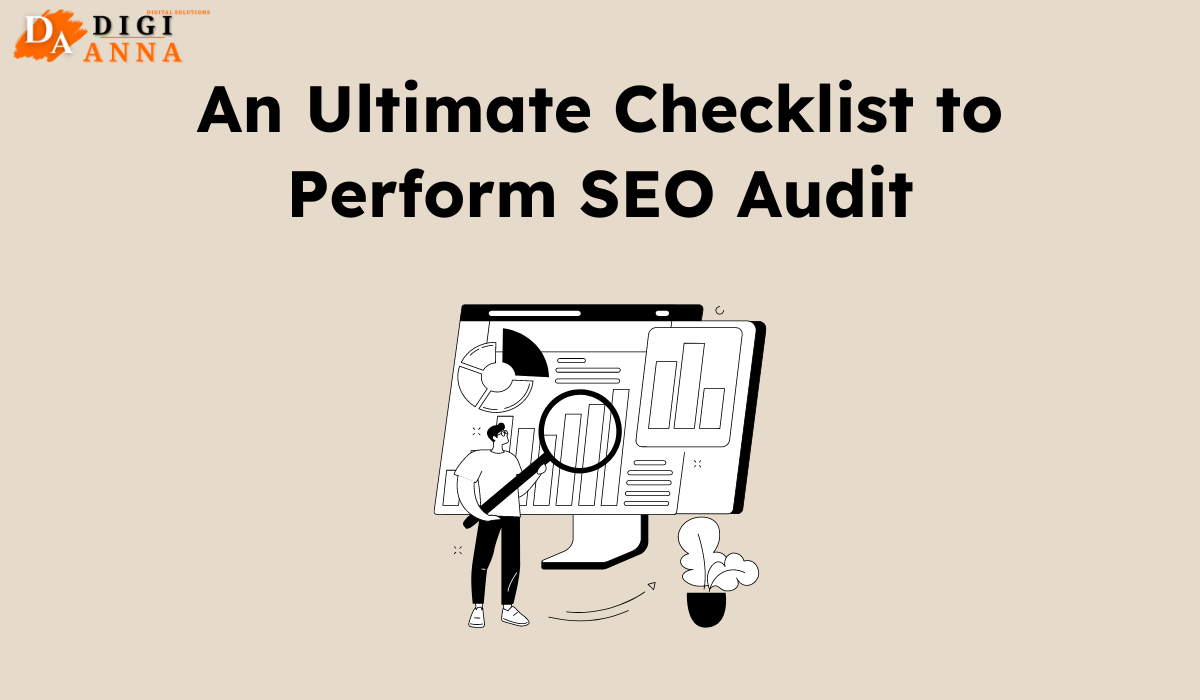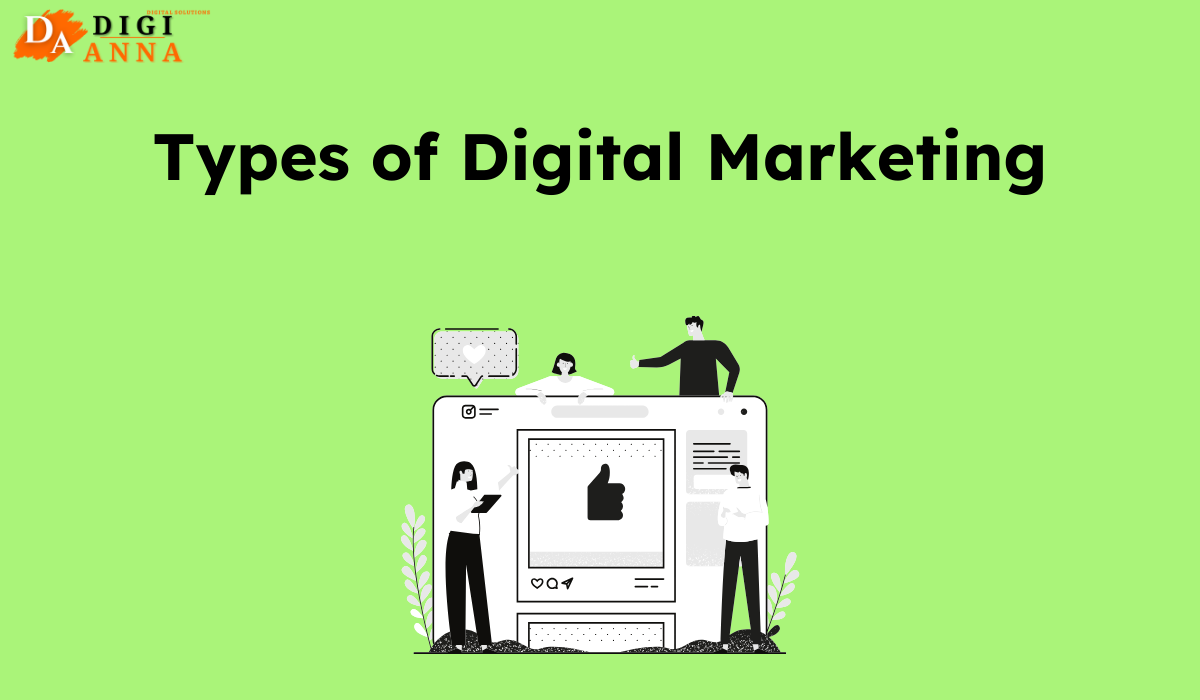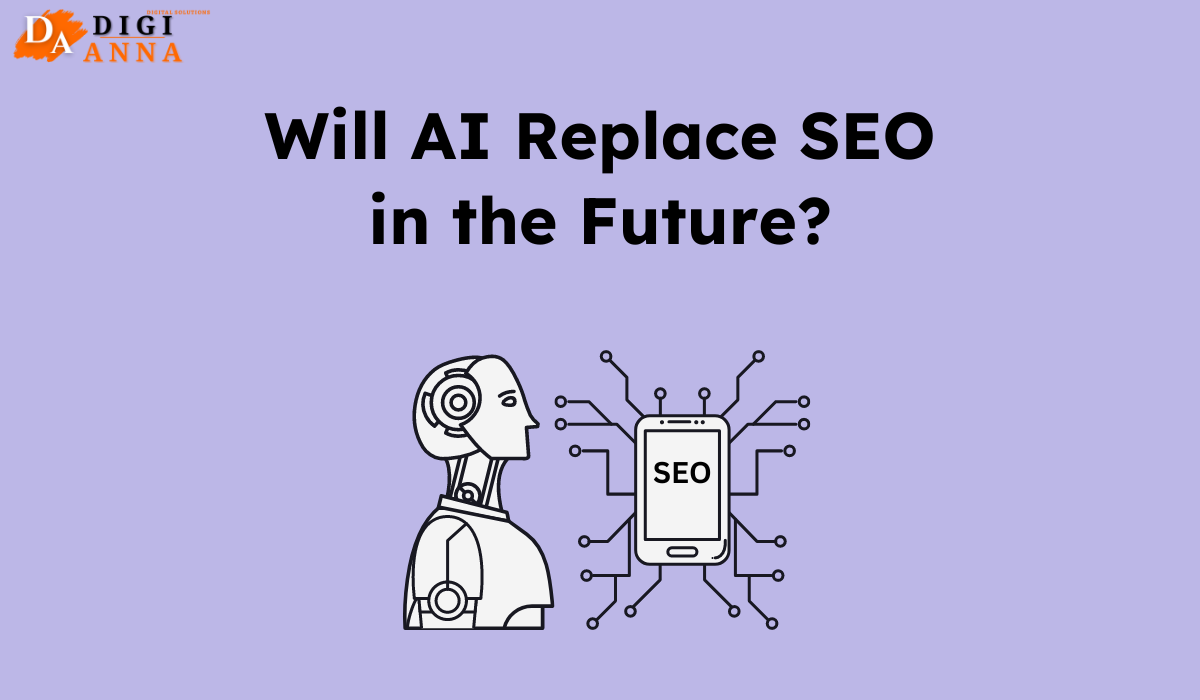In today’s fast-paced digital landscape, digital marketing has become more than just a trend. It utilizes electronic devices to convey promotional messages and measure impact along the customer journey. In practice, it encompasses online campaigns across various devices like computers, phones, and tablets in the form of online video, display ads, search engine marketing, paid social ads, and social media posts. This blog will drive you through the things you need to know about digital marketing.
Alright, let’s go!
What is Digital Marketing?
Digital Marketing refers to promoting products or services using digital media, primarily on the internet and various online platforms. It is also called online marketing. For instance, consider a company aiming to expand its reach for a new software product. They utilize digital marketing tools like social media ads, content marketing, and email campaigns to engage their target audience. This comprehensive approach strategically targets potential customers across different online channels. Consequently, the product gains visibility, attracting potential buyers through high-quality content and personalized advertisements.
Therefore, companies may effectively interact with their audience through the versatility of digital marketing, which promotes engagement and increases conversions.
In a digital environment, digital marketing follows the same rules as traditional marketing. It uses consumer data to identify a company’s target market and provide relevant content.
Wonder! Why are companies running behind it?
Importance of Digital Marketing
Your business can attain success through various digital channel promotions. Utilizing these platforms conveniently has become vital in this digital era. The booming market favors digital marketing due to its extensive reach and benefits, facilitating efficient marketing of products and services.
Let’s understand why this form of marketing is significant?
1. Broaden Geographical Scope
Online users can view your advertisements regardless of where they reside (as long as you don’t limit their geographic reach). You may broaden your audience and establish connections with more individuals through the numerous digital channels.
2. Cost-Effectiveness
Digital channels offer lower costs than traditional marketing channels like television, radio, and print advertising. The only expense is the time you spend creating the content website and social media posts.
Additionally, Social media accounts can be created at no cost and stay online as long as you keep them active. People will find your stuff even years after you’ve uploaded it. Compared to a single TV commercial, this has a longer shelf life.
3. Provide Measurable Results
Analytics opportunities are enormous with digital marketing, which traditional marketing cannot match. The number of leads and conversions, website visits, and much more can all be tracked, providing you with useful information that can aid in your company’s growth.
Digital marketing enables you to,
- With built-in analytics, monitor social media activity.
- Track each blog post’s organic traffic and SERP rankings.
- Collect accurate information on views, clicks, and conversions from paid advertising.
However, utilizing digital marketing facilitates confidential discussions with customers. You can interact with them directly through a blog or social media post to gather more details on how they found you, what they think, and what they need. Consequently, it provides you with data about your marketing initiatives that are both quantitative and qualitative, which is priceless!
4. Easier Personalization of Your Marketing Initiatives
The basis of digital marketing is customer data. Businesses naturally discover much about their potential clients during a digital marketing campaign since it demands so much data. Thanks to this data, it’s never been simpler to customize your marketing initiatives.
For instance, companies use client information for these reasons:
- Observe their social media followers’ activity to determine the preferred post types and content categories.
- Segment your customer base according to their demographics to make it simpler to customize your messaging to their needs.
- In email campaigns, address customers by name.
- Recognize significant occasions like birthdays and anniversaries of customers.
5. Enhance Your Connection With Customers
Digital marketing allows you to communicate directly with customers in real time, providing them with a platform for interaction with you and vice versa.
The social media strategy should be at the forefront of your mind. As the target audience views and comments on your latest post, it’s incredibly exciting. Furthermore, it generates even more excitement around your product or service, consequently increasing visibility with each additional person seeing what you’re sharing.
Through active involvement in the brand narrative, engagement levels naturally increase. This sense of ownership, thereby leads to strong brand loyalty. Customers also reap the benefits of this interactive experience, further raising their commitment to the brand.
6. Conversions are Simple and Effortless
Digital marketing makes it simple to boost conversions because of its cross-channel connection. Customers may quickly move from a social networking platform to your online store to complete their purchase. They can save a post or click a link, allowing them to move along the sales funnel easily. Even if they don’t make a purchase immediately, they will stay in contact with your company and enable further interaction.
How Digital Marketing is Different From Inbound Marketing?
Attracting customers naturally by offering valuable content is inbound marketing. Unlike traditional methods, it focuses on building relationships and trust. By creating compelling content such as blog posts, videos, and social media posts, businesses can attract visitors to their websites. Once visitors are on the website, the goal is to convert them into leads by offering something of value, like a free ebook or webinar, in exchange for their contact information. Once businesses have leads, they can nurture them through email marketing campaigns, personalized content, and targeted messaging.
Both the Inbound marketing and digital marketing are crucial for business, yet they differ fundamentally.
- Inbound marketing concentrates on attracting customers through valuable content creation, while digital marketing involves promoting products or services through various online channels like social media, email, and search engines.
- Inbound marketing prioritizes relationship-building by providing helpful information, whereas digital marketing focuses on utilizing digital channels for promotion.
Although the approaches have different methods, they both aim to attract customers and increase sales.
Is Digital Marketing Effective For All Businesses?
Absolutely! Digital marketing offers versatile strategies customized to the unique needs and objectives of each business type.
B2B is all about selling goods and services to other businesses. It builds relationships and demonstrates expertise to attract potential business clients. On the other hand, B2C digital marketing targets individual consumers, aiming to create emotional connections and trigger immediate purchases.
B2B enterprises benefit from content marketing, email campaigns, and LinkedIn networking to establish authority and nurture leads within professional circles. Conversely, For B2C businesses, platforms like social media, influencer marketing, and targeted advertising resonate well with consumers, fostering engagement and driving conversions.
B2B marketing often involves longer sales cycles and emphasizes the value and functionality of products or services, while B2C marketing focuses on appealing to emotions and desires to drive quick purchases.
Moreover, B2B and B2C marketers utilize various digital channels such as social media, email marketing, and content marketing to reach their respective audiences.
Key Performance Indicators (KPIs) of Digital Marketing
Key Performance Indicators (KPIs) of Digital Marketing are like scorecards that show how well your online strategies are working. By tracking KPIs, businesses can see what’s effective and what needs improvement in their digital marketing efforts.
Some of the most common Key Performance Indicators (KPIs) that marketers utilize to assess their performance:
- Click-Through Rate (CTR): Assess the effectiveness of online ads by calculating the percentage of viewers who clicked on an ad.
- Conversion Rate: Goes beyond CTR by measuring the percentage of viewers who completed a desired action, like making a purchase, compared to the total audience reached.
- Social Media Traffic: Monitor engagement on company social media profiles, including likes, follows, views, shares, and other measurable actions.
- Website Traffic: Track the number of visitors to a company’s website over a specific period, aiding in evaluating the success of marketing efforts in attracting consumers.
Types of Digital Marketing
Digital marketing encompasses many specializations and methods of engaging with digital media. Below are the different types of digital marketing tactics.
1. Search Engine Optimization
By optimizing content with relevant keywords, SEO helps your website rank higher on search engines. Consequently, your website becomes visible to potential visitors, which increases website traffic and enhances your online presence.
2. Content Marketing
Content marketing aims to connect with potential customers by sharing engaging, valuable and relevant content. This can include blog posts, videos, infographics, and more, positioning your brand as an authority in your industry.
3. Social Media Marketing
Social Media Marketing utilizes platforms such as Facebook, Instagram, and Twitter for business promotion. It involves interacting with audiences via posts, comments, and shares to enhance brand visibility and increase website traffic. Moreover, it provides affordable advertising choices, enabling targeted outreach to specific demographics, therefore maximizing impact.
4. Pay-Per-Click ( PPC) Advertising
PPC advertising allows businesses to bid for ad placement on search engines and websites, paying a fee each time their ad is clicked. It’s a targeted approach to reaching potential customers who are actively searching for products or services like yours
5. Affiliate Marketing
Affiliate marketing involves affiliates promoting a company’s products or services to their audience. They earn commissions or finder’s fees when customers make purchases through their referrals. Unlike influencer marketing, where payment is for endorsements, in affiliate marketing, compensation is based on actual sales generated.
6. Influencer Marketing
Influencer marketing involves collaborating with popular individuals online to promote products or services. It’s an effective way to reach a larger audience authentically. By leveraging influencers’ credibility and following, brands can enhance visibility and engagement. This marketing approach capitalizes on influencers’ influence to drive brand awareness and sales.
7. Email Marketing
The way to send messages to a group of people via email is Email marketing. It is a valuable tool for businesses to connect with customers and promote products or services. Additionally, it helps in building relationships and increasing brand awareness.
8. Mobile Marketing
Mobile marketing, also referred to as SMS marketing, involves promoting products or services through smartphones and other mobile devices. By targeting mobile users, businesses can reach a wider audience and increase engagement. Utilizing mobile-friendly strategies is essential for modern marketing success, ensuring seamless interactions and conversions.
9. Video Advertising
Video advertising, also known as video marketing, captivates audiences with engaging visuals and compelling messages. It’s an effective way to engage audiences, boost brand awareness, and drive conversions. Incorporating videos into your marketing strategy can significantly enhance your online presence and attract more customers.
How to Integrate Digital Marketing in Your Business?
Digital marketing can appear in so many different forms that it may take time to choose from all of them. That is why it is critical to understand what is digital marketing and how it works in order to integrate it into your business plan.
Whatever your sector or business type is, you can proactively adopt it as your go to strategy by following these simple steps:
1. Establish your goals
Goals are a crucial part of any marketing strategy, including digital marketing. The first step is to set quantifiable, feasible, and relevant goals for your digital marketing initiatives that link with your company’s objectives.
Important metrics to consider include:
- Impressions
- Reach
- Clicks
- Click-Through Rate (CTR)
- Engagement Rate
- Conversions
- Cost Per Lead (CPL)
- Effective Cost Per Thousand Impressions
2. Determine your intended audience
Now that you know your objectives, you must identify your target audience. These are those who will be reached by your campaign. Every audience is unique. Therefore, it’s vital to determine who is hearing your message.
3. Make a spending plan for each digital channel
Setting a budget allows you to allocate resources more effectively. It is crucial if you combine organic and paid advertising – you don’t want your paid channels to consume too much of your money.
4. Choose your digital marketing channels wisely
After establishing a budget, it’s time to decide on which channels you’ll concentrate on. The idea is to find an appropriate balance between paid and organic channels. While sponsored methods such as PPC might produce instant results, organic strategies such as SEO have long-term benefits. Pursuing both types of techniques will position you for success in digital marketing.
5. Make your web pages mobile-friendly
Mobile traffic is expected to surpass desktop traffic in the future. For that reason, it’s essential to ensure that all of your marketing content works properly on mobile devices, even if it was created for a traditional browser. The thing equally important in digital marketing is to create a smooth experience between mobile and desktop to avoid losing users who switch between the two.
6. Conduct keyword research
Keywords are the foundation of delivering campaign content to your target audience. Therefore, conducting thorough keyword research, including social media keyword research, becomes crucial. It optimizes your website and content for SEO, ensuring that people can find your business via search engines and social media channels.
7. Repeat steps according to the gathered analytics data
This strategy benefits to ensure the sustainability of an effective campaign. For consistent customer traffic, use analytics to monitor and update your web pages.
Take Away!
Digital marketing is essential for the growth and success of the business. Every business should make it a key part of the overall marketing strategy. There has never been an easier way to stay connected to customers than through digital channels, and no other method offers the same level of personalization. Therefore, explore the ease and effectiveness of integrating it into your overarching marketing plan.

